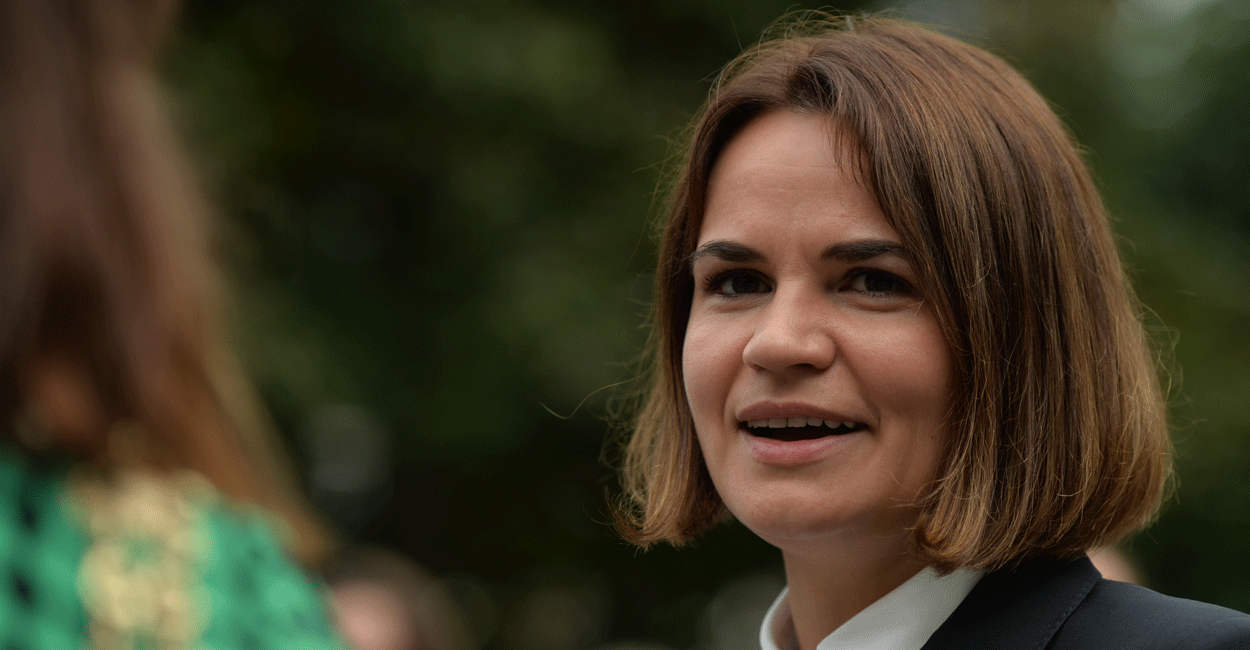Sviatlana Tsikhanouskaya, who has quickly risen to fame in Belarus for defying her country’s repressive regime, is now visiting top U.S. officials in Washington, D.C. Her goal is to seek support for the Belarusian people and discuss how the U.S. can help resolve the dire political crisis that has gripped her nation.
Tsikhanouskaya has quickly risen to fame over the past year as an opposition leader. She did not intend for this to happen, but only decided to run for Belarusian president after her husband, Siarhei Tsikhanousky, was disqualified from doing so after being arrested for organizing pro-democracy protests.
In so doing, she has become the face of the democratic movement in Belarus.
The Daily Signal depends on the support of readers like you. Donate now
Her journey began on Aug. 9, 2020, when Belarus held its presidential election. The then-26-year incumbent, Alyaksandr Lukashenka, nicknamed the last dictator in Europe, claimed victory. But local observers declared the election to be fraudulent. When the polls closed, the Belarusian people took to the streets to protest the outcome. Nearly a year later, Belarusians are still protesting to this day.
They do not want Belarus to become aligned with the West—in fact, they are satisfied with Belarus maintaining its close relations with Russia. They are protesting because they want to be able to choose their own destiny without interference from their own corrupt government.
Lukashenka has violently cracked down on the protesters. So far, Belarusians have suffered arrests and beatings in response to their protests.
More than 550 Belarusians currently sit in jail as political prisoners, and 11 Belarusian activists were assigned lengthy prison terms just this past weekend.
Lukashenka’s crackdown also affects independent journalists and civil rights groups. Independent media is repressed in Belarus, and multiple journalists from Radio Free Europe/Radio Liberty, a U.S. government-funded news organization, have been arrested, along with journalists from news outlets like Svaboda and Belsat TV, and various regional outlets.
“One by one, the [Lukashenka] regime destroys every media that dares to tell the truth about the situation in Belarus,” Tsikhanouskaya said on Twitter.
This week, Tsikhanouskaya is scheduled to meet with U.S. officials in the State Department, the White House, the Senate, and a few different nongovernmental organizations and think tanks. When she meets with them, she will surely make clear how dire the current situation is in Belarus.
Belarus has largely been off the United States’ radar for months. This has been a mistake. Hopefully, Tsikhanouskaya’s trip will bring Belarus back onto the U.S. radar.
In an interview with CNN, Tsikhanouskaya stressed that “only the joint position of the U.S. and EU, joint sanctions, pressure [on the Lukashenka regime], and assistance to Belarusian civil society would help [the Belarusian] people.”
The United States should care about Belarus. It is a nation comprised of citizens fighting for human rights, free speech, and the ability to decide their own future. Belarus needs the United States’ support because it has never truly emerged from its Soviet past. Lukashenka essentially operates as a Soviet dictator.
The First Amendment of the U.S. Constitution states that there shall be no law in the United States “abridging the freedom of speech, or of the press; or the right of the people peaceably to assemble, and to petition the government for a redress of grievances.”
The Belarusian people are fighting for this same right. Thus, America should naturally be interested in promoting democratic reforms in Belarus.
It is time for the U.S. to prioritize helping the Belarusian people.
Have an opinion about this article? To sound off, please email letters@DailySignal.com and we’ll consider publishing your edited remarks in our regular “We Hear You” feature. Remember to include the URL or headline of the article plus your name and town and/or state.
































